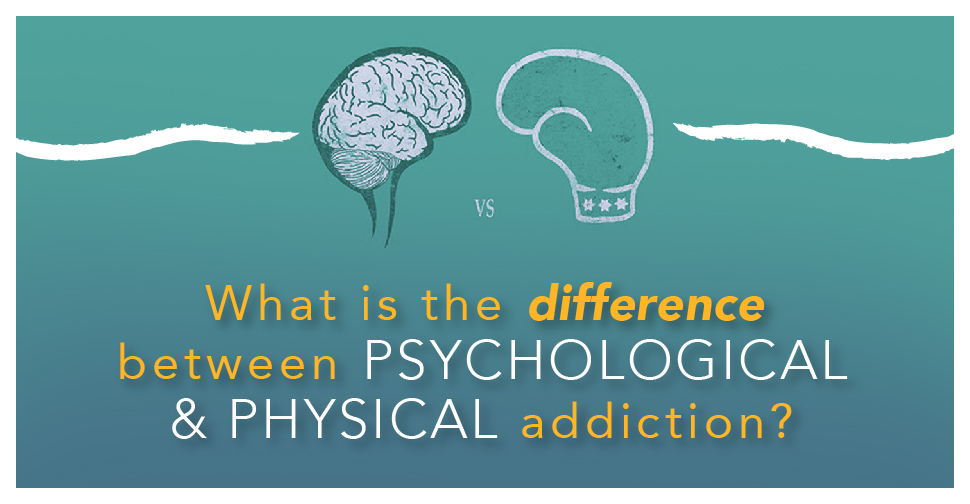
Understanding your addiction is key to knowing how to beat it and stay clean. However, you’ve heard two different terms – psychological and physical addiction – that have left you with more questions than answers. Simply put, these types of addiction are generally related to each other, but have much different warning signs and significations. Understanding the differences between the two of them can help you make real progress on your road to recovery.
Physical Addiction Is Just That – Physical
Physical condition is a state of dependency that causes what Cancer.gov refereed to as “unpleasant physical symptoms.” These symptoms occur when the drug is no longer taken or if it is ingested in smaller doses. Often, physical addiction requires higher and higher levels of drug to be satisfied.
Other symptoms that define physical drug dependency include:
- Loss of personal control
- Inability to quit
- Neglecting personal activities
- Drug use taking precedence over everything else
- Serious withdrawal symptoms, such as anxiety, jumpiness, nausea, insomnia, depression, and even delirium tremens (in the case of alcohol addiction), a potentially life-threatening situation
Physical addiction is no laughing matter: it affects millions of people across the country and can ruin lives. However, it almost always goes hand-in-hand with psychological addiction. The science of addiction is complex and psychological problems and addiction is almost always an influence.
Psychological Addiction Is More Difficult to Understand
Psychological addiction can be defined as the psychological dependency on a substance. While physical addiction is commonly associated and interwoven with psychological addiction, this isn’t always the case. For example, marijuana is often classified as a non-physically addictive substance. However, many substance abuse experts classify it as psychologically addictive.
The influences behind psychological addiction are complex because they vary from case to case. Some people believe that their drug is the only thing that keeps them safe or calm, i.e. people who self medicate with marijuana or other relaxing drugs. Others have serious psychological problems, such as depression, anxiety, or bipolar disorder, that cause them to compulsively use drugs.
The study of psychological addiction has led to the creation of the psychopathological model, the concept that mental disorders are the primary cause of all addictions. These disorders include emotional problems, cognitive-behavioral disorders, and more. This model seeks to eliminate the psychological impulses behind addiction, but ignores the physical aspects as being only tangentially related to the problem.
Both Play A Major Toil On Your Well-Being
While some addiction therapists have declared psychological addiction a tougher nut to crack, physical addiction is still a major problem. Remember: physical addiction tricks your body into thinking it can’t possibly live without an addictive substance. As a result, you will suffer whether you keep using or if you quit. It’s a problematic “lose-lose” that requires nerves of steel and real dedication to beat.
That said, psychological addiction is just as problematic: drug addiction hijacks the brain and rewires it to “need” the drug, both physically and psychologically. This occurs because of the indiscriminate way that the brain release the pleasure chemical, dopamine: it triggers this chemical whenever it’s supposed to feel pleasure, regardless of how it is caused.
Unfortunately, drugs release a much higher concentration of dopamine release than any other method, meaning all other pleasures in life can feel physically and psychologically inferior. This can cause people to lose pleasure in everything but drug use: an example of physical and psychological addiction working hand-in-hand.
Even worse, drug use actually interferes with the concept of memory and learning. It takes over these centers and focuses all memory and learning on drug use. As a result, it can quickly become a psychological compulsion, as its use becomes both the means and an end.
Get The Information You Deserve
 If you’re concerned about your own addiction and need physical and psychological help, please don’t hesitate to contact us as soon as possible. Whether you are physically or psychologically addicted to drugs– or both, we can help you find the treatment option you need to get clean and stay clean. Remember: it’s never too late to regain control of your life. Contact us today at DrugRehab.org and get your life back!
If you’re concerned about your own addiction and need physical and psychological help, please don’t hesitate to contact us as soon as possible. Whether you are physically or psychologically addicted to drugs– or both, we can help you find the treatment option you need to get clean and stay clean. Remember: it’s never too late to regain control of your life. Contact us today at DrugRehab.org and get your life back!

